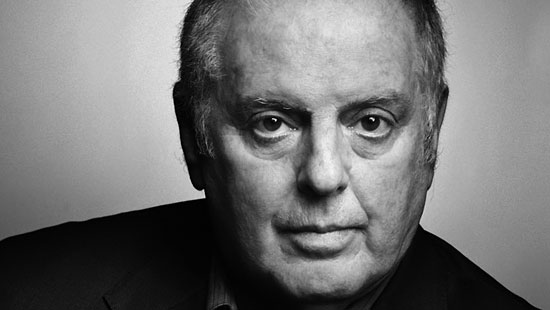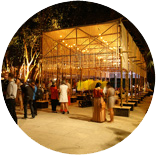Daniel Barenboim

Daniel Barenboim is a world-renowned conductor and pianist. Since his international debut performance as a solo pianist at the age of ten, he has regularly performed in Europe and the United States, as well as in South America, Australia, and Asia. Barenboim has also been in great demand as a conductor with leading orchestras around the world. He currently serves as general music director of the Staatsoper Unter den Linden and maestro scaligero of the Teatro alla Scala in Milan. He is honorary conductor for life of the Chicago Symphony Orchestra and principal conductor for life of the Staatskapelle Berlin.
In 1999 Barenboim and Palestinian literary scholar Edward Said set up the West-Eastern Divan Orchestra, which brings together young musicians from Israel and the Arab countries every summer with the aim of enabling a dialogue between cultures and promoting this through the experience of making music. Barenboim has also initiated a project for music education in the Palestinian territories, which includes the foundation of a music kindergarten as well as a Palestinian youth orchestra.
In 2002 Barenboim and Said were awarded the Príncipe de Asturias Prize for their peace efforts. Barenboim is the recipient of numerous other prestigious awards, both for his contributions to peace and tolerance and for his achievements in music, among them the Tolerance Prize by the Evangelische Akademie Tutzing, the Peace Prize by the Korn and Gerstenmann Foundation in Frankfurt, the Moses Mendelssohn Medal, the Buber-Rosenzweig-Medal, the Hessische Friedenspreis, the Preis des Westfälischen Friedens, Germany’s Großes Verdienstkreuz mit Stern, the Goethe Medal, France’s Grand Officier dans l’Ordre national de la Légion d’Honneur, the Wolf Foundation’s Arts Prize, the Kulturgroschen, the highest honor awarded by the Deutscher Kulturrat, the international Ernst von Siemens Musikpreis, Japan’s Praemium Imperiale, and the German Kulturpreis. In 2003 Barenboim, the Staatskapelle Berlin, and the chorus of the Staatsoper Unter den Linden were awarded a Grammy for their recording of Wagner’s Tannhäuser. He and the Staatskapelle were also honored with the Wilhelm-Furtwängler-Preis the same year.
In 2006 Barenboim was invited to deliver the BBC Reith Lectures, and a six-part lecture series at Harvard University as Charles Eliot Norton Professor. United Nations Secretary General Ban Ki-moon named Barenboim a U.N. Messenger of Peace the following year. Barenboim has received honorary degrees from the University of Oxford and the Royal Academy of Music in London and is the author of a number of books: an autobiography, A Life in Music; Parallels and Paradoxes, which he wrote with Edward Said; Everything Is Connected; and, with Patrice Chéreau, Dialoghi su musica e teatro: Tristano e Isotta.
Photo: © Peter Adamik
Vision Statement on Confronting Comfort:
A Conductor’s View on Comfort
Noise and sound are defining elements of any city, part of the rhythm of its days and nights. As a conductor and pianist, I wish to write about comfort and the city through the language that I have lived and worked in my entire life, music. Can comfort in a city, in a town, or in a home be considered synonymous with harmony? What does comfort mean, and can we go beyond its more superficial definition to address the larger questions of a society’s well-being? Can comfort oppose hunger and stand for health, counter despair and promote happiness, fight against war and encourage peace?
I believe a society’s comfort is a reflection of all its citizens, and must be addressed so as to assure that each one of them is considered. Like an orchestra, a city is made up of multiple parts. In order for the music of the city to be fluid and successful, each member of its ensemble needs to be focused, healthy, and part of the process. Without a voice from everyone, something is lost from the composition of a city.
When I founded the West-Eastern Divan Orchestra with Edward Said in 1999, we did so with the hope and intention of showing that differences and barriers that many consider insurmountable can be bridged and broken down through communication. The West-Eastern Divan Orchestra stands as an example that harmony can be found between differences, and that beauty can be built from a diversity of identities. While we knew that an orchestra cannot and will not be the creator of peace, we hoped that the West-Eastern Divan Orchestra could raise awareness of the possibilities for peaceful coexistence. Continued conflict in the Middle East, and more recent clashes throughout the Arab world and beyond, show that too often force is chosen over nonviolent negotiation.
I truly believe that music can be considered a lesson for life and for cities. Every orchestra can be seen as a microcosm of society; it is a group of individuals, each with their own freedom and responsibility to express themselves, but each also having to listen to and engage with others in the group. In addition, the conductor, as a leader to this group, will not be successful unless she or he understands the orchestra, and unless the individuals in the orchestra understand her or him. This relationship is based on shared trust and equality among all members of the group, and is broken when defined by power and individuality alone. When the orchestra plays a composition, no individual is a leading voice at all times, and the music changes and develops, passing through periods of stillness and madness, but what defines a great orchestra is harmony and understanding among its members, and this creates beauty for its listeners. These lessons have the power to reach well beyond the language and study of music, to the spheres of politics, economics, media, education, and culture.
Greater equality, cooperation, and justice in a society mean greater comfort for all. We need to learn that what is good for one should not be bad for another, and that it is possible to find thoughtful and meaningful cooperation between different segments of society, different states, different countries, different religions, and different identities. As in music, we all share a common existence, although we may express it in an infinite number of ways. We must embrace those differences and use them to create peace, not perpetuate violence and inequality.
I hope that the BMW Guggenheim Lab can be a new voice to raise awareness and open people’s eyes to the challenges that we face and that we can overcome if we do so together. Like any city, or orchestra, the Lab Team is a group made up of different people, from different disciplines and practices, but it is through their collaboration that ideas for the cities of tomorrow can be discovered. With every new composition I conduct, I start anew, with knowledge gained from my past experiences. Every day gives us a chance to start again, and I encourage us to do so, with acquired understanding from our history, and the willingness to learn and to listen, today and in the future.

